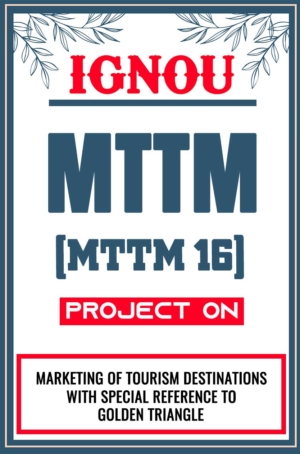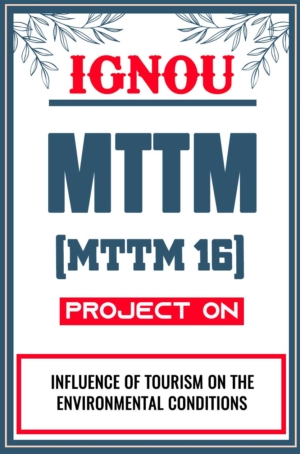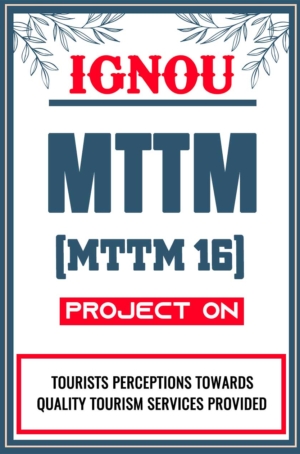Buy IGNOU MTTM Project for MTTM 16
The IGNOU MTTM Project is a compulsory research component known as MTTM 16 in Master of Tourism & Travel Management Programme to its learners in IGNOU. The aim of this IGNOU MTTM Project is to hone your research abilities, develop a practical grasp of the tourism system, and provide field experience. The IGNOU MTTM Project will help you develop management capabilities or in establishing yourself as a researcher or an activist concerned with the sustainable development of tourism. Of course, this will depend on the topic that you choose for the project.
Whatsapp us to get the Personalized (Customized) IGNOU MTTM Project Report and Synopsis
Download Link for IGNOU MTTM Project (PTS 1/2/4/5/6 PDF)
What is the format of the IGNOU MTTM Project report?
The format of the MTTM project report typically follows a structured approach to ensure clarity, coherence, and academic rigor. Here’s a general outline of the format:
1. Title Page:
- Includes the project title, your name, enrollment number, study center, and the month/year of submission.
2. Declaration:
- A statement declaring that the project report is your original work and has not been submitted elsewhere for any degree or diploma.
3. Certificate:
- A certificate confirming that the project work has been conducted under the guidance of an IGNOU-approved project guide.
4. Acknowledgments:
- Expresses gratitude to those who have provided support and assistance during the project.
5. Table of Contents:
- Lists all the chapters, sections, and subsections along with their respective page numbers.
6. List of Tables/Figures:
- If applicable, provides a list of all tables and figures included in the project report, along with their respective page numbers.
7. List of Abbreviations and Acronyms:
- Includes a list of abbreviations and acronyms used in the project report, along with their full forms.
8. Abstract:
- A concise summary of the entire project report, including the objectives, methodology, major findings, and conclusions. It should typically not exceed 300-400 words.
9. Introduction:
- Provides an overview of the topic, background information, objectives of the study, and the significance of the research.
10. Literature Review:
- Summarizes and critiques existing literature relevant to your research topic. It establishes the theoretical framework and context for your study.
11. Methodology:
- Describes the research design, methods of data collection (if applicable), tools used for analysis, and any ethical considerations. It should justify why these methods were chosen.
12. Results and Discussion:
- Presents the findings of your research in a clear and structured manner. It interprets the results, relates them to the research questions or hypotheses, and discusses their implications.
13. Conclusion:
- Summarizes the main findings of the study, discusses their significance, and suggests any recommendations or implications for future research or practice.
14. References/Bibliography:
- Lists all sources cited in the project report. Follows a specific citation style (like APA, MLA, etc.) as per IGNOU guidelines.
15. Appendices:
- Includes supplementary material such as raw data, questionnaires, or additional detailed information that supports the main text but is not essential for understanding it.
IGNOU MTTM Project Report Sample Topics
- Marketing Of Tourism Destinations With Special Reference To Golden Triangle
- A Study On The Services Of Hotel Industry
- Role Of Travel Agency In Promotion Of Indian Tourism: A Case Study Of Thomas Cook (India) Limited
- Financial Performance Of Country Club Hospitality & Holidays
- Customer Satisfaction With Special Reference To Radisson Blu Hotel
- Study About Training Effectiveness In Luxury Hotels
Can you conduct field research for your IGNOU MTTM Project?
Yes, conducting field research for your MTTM project is often encouraged, especially if your research topic requires gathering primary data or exploring real-world scenarios within the tourism and travel industry. Here are some considerations and guidelines for conducting field research:
- Research Topic Suitability: Determine if your research question and objectives necessitate primary data collection through field research. Topics such as destination management, tourist behavior, sustainability in tourism, and tourism marketing often benefit from field studies.
- Ethical Considerations: Ensure that your research adheres to ethical guidelines, especially regarding participant consent, confidentiality, and respectful conduct during data collection.
- Methodological Approach: Choose appropriate research methods for your field research, such as surveys, interviews, observations, or focus groups. Align these methods with your research objectives and the type of data you aim to collect.
- Permissions and Approvals: If your field research involves interactions with organizations, destinations, or individuals, obtain necessary permissions and approvals beforehand. This includes approvals from your study center and any relevant authorities.
- Data Collection: Conduct data collection systematically, ensuring reliability and validity of your findings. Keep detailed records of your observations, interviews, or survey responses.
- Data Analysis: After collecting data, analyze it using appropriate methods and tools. Ensure that your analysis addresses your research questions and contributes to your project’s objectives.
- Integration into Project Report: Integrate your field research findings seamlessly into your project report. Clearly explain how your field research contributes to your understanding of the topic and supports your conclusions.
- Time Management: Plan your field research activities effectively to meet project deadlines and academic requirements. Consider factors like travel time, access to resources, and potential challenges that may arise during fieldwork.
How should you prepare for the viva voce (oral examination) of the MTTM project?
The viva voce is typically conducted after you submit your project report. Prepare by revisiting your research findings, methodology, and being ready to discuss any questions related to your project.
What if you face challenges during the IGNOU MTTM project process?
If you encounter challenges, such as difficulties in data collection or analysis, communicate promptly with your project guide and seek guidance from IGNOU’s study center. They can provide assistance and suggest solutions.
What are the evaluation criteria for the IGNOU MTTM Project report?
The evaluation criteria for the MTTM project report typically focus on assessing various aspects of your research and presentation. These criteria ensure that your project meets academic standards and effectively demonstrates your understanding and application of knowledge in the field of tourism and travel management. Here are common evaluation criteria:
Relevance and Originality:
- The extent to which your project addresses relevant issues or challenges in the tourism and travel industry.
- Originality of your research approach, ideas, or findings.
Clarity of Objectives:
- Clear articulation of research objectives and their alignment with the chosen research topic.
- Justification for why these objectives are significant and worthy of investigation.
Literature Review:
- Depth and breadth of your literature review, demonstrating a thorough understanding of existing theories, concepts, and research related to your topic.
- Critical analysis and synthesis of literature to establish the theoretical framework for your study.
Methodological Rigor:
- Appropriateness of research methods chosen (e.g., qualitative, quantitative, mixed methods) and their alignment with research objectives.
- Adequacy of data collection methods and tools used, including sampling techniques and data analysis procedures.
Analysis and Interpretation of Findings:
- Clarity and coherence in presenting your research findings.
- Depth of analysis and interpretation of findings in relation to your research questions or hypotheses.
- Use of appropriate analytical techniques to derive meaningful conclusions.
Discussion and Implications:
- Thorough discussion of your findings in relation to existing literature and theoretical concepts.
- Identification of implications of your findings for theory, practice, policy, or further research in the field of tourism and travel management.
Structure and Organization:
- Overall organization and structure of the project report, including logical flow of chapters and sections.
- Adherence to IGNOU’s formatting and submission guidelines, including correct citation style and bibliography.
Writing Quality and Presentation:
- Clarity, coherence, and academic rigor in writing.
- Proper grammar, spelling, and sentence structure.
- Professional presentation of tables, figures, and other visual aids.
Contribution to Knowledge:
- The extent to which your project contributes new insights, knowledge, or practical recommendations to the field of tourism and travel management.
Viva Voce Examination (if applicable):
- Performance in the oral defense (viva voce) of your project, including your ability to defend your research methodology, findings, and conclusions.
What support is available from IGNOU during the IGNOU MTTM Project process?
IGNOU provides several forms of support to students during the MTTM project process to ensure successful completion of their projects. Here are the key types of support available:
- Study Material and Guidelines: IGNOU offers comprehensive study materials and guidelines specifically tailored for MTTM projects. These materials include project guidelines, templates for synopsis and project report, and examples to help students understand the requirements.
- Academic Counseling: Students are assigned a project guide or supervisor who provides academic counseling and guidance throughout the project process. The project guide assists in refining the research topic, reviewing progress, and providing feedback on drafts of the synopsis and project report.
- Workshops and Seminars: IGNOU organizes workshops, seminars, and orientation sessions related to project planning, research methodology, data analysis techniques, and project writing skills. These sessions help students enhance their research capabilities and improve their project management skills.
- Access to Study Centers: IGNOU study centers serve as hubs where students can access resources, consult with faculty members, and attend academic sessions related to their projects. Study centers also facilitate interactions with other students pursuing similar projects.
- Online Resources: IGNOU’s online platform provides access to additional resources such as e-books, journals, and databases that students can use for literature review and research purposes. This online support is particularly beneficial for accessing up-to-date information and scholarly articles relevant to tourism and travel management.
- Evaluation and Feedback: IGNOU ensures a structured evaluation process for project synopses and reports. Feedback provided by evaluators helps students improve their work and meet academic standards. Students are also informed about the evaluation criteria and expectations beforehand.
- Administrative Support: IGNOU provides administrative support related to project registration, submission deadlines, and examination schedules. Clear communication channels ensure that students receive timely information and assistance regarding administrative matters.
Can you publish your IGNOU MTTM Project findings in journals or present them at conferences?
Yes, you can certainly publish your MTTM project findings in journals or present them at conferences, provided your research contributes significantly to the field and meets the standards of academic publication or conference presentation. Here are some key considerations and steps:
Significance of Findings:
- Ensure that your project findings offer new insights, contribute to existing knowledge in tourism and travel management, or address significant industry challenges. This is crucial for potential acceptance in journals or at conferences.
Permission and Approval:
- Before publishing or presenting, obtain necessary permissions and approvals. This may include approval from IGNOU if your project involves data from the university or its affiliates, as well as consent from any participants involved in your research.
Choosing Journals or Conferences:
- Select appropriate journals or conferences that specialize in tourism, hospitality, or related fields. Consider factors such as the journal’s scope, audience, impact factor, and submission guidelines. For conferences, ensure they accept submissions relevant to your research area.
Formatting and Submission:
- Follow the specific formatting and submission guidelines of the chosen journal or conference. Prepare your manuscript or abstract according to their requirements, including citation style, word count, and formatting of figures or tables.
Peer Review Process:
- If submitting to a journal, your manuscript will undergo peer review, where experts in the field assess its quality, originality, methodology, and contribution to knowledge. Address reviewers’ comments and revise your manuscript accordingly.
Presentation Skills:
- If presenting at a conference, prepare a clear and engaging presentation that highlights your research objectives, methodology, findings, and implications. Practice your presentation to effectively communicate your work to the audience.
Networking and Collaboration:
- Conferences provide opportunities to network with other researchers and industry professionals. Engage in discussions, seek feedback on your work, and explore potential collaborations for future research endeavors.
Publication Ethics:
- Adhere to ethical standards in publishing, including proper attribution of sources, avoidance of plagiarism, and compliance with journal or conference policies regarding authorship and conflicts of interest.
Ready to get your IGNOU MTTM Project Report and Dissertation Synopsis Sample PDF for MTTM 16?
- Call us or WhatsApp us at: 9958947060, 9354637830
- Visit: SHRICHAKRADHAR.COM
-
Sale!

-
Sale!

IGNOU MTTM Project (MTTM 16) Synopsis/Proposal & Project Report/Dissertation in Hard-Copy (Sample-9)
Original price was: ₹499.00.₹249.00Current price is: ₹249.00. -
Sale!

IGNOU MTTM Project (MTTM 16) Synopsis/Proposal & Project Report/Dissertation in Hard-Copy (Sample-8)
Original price was: ₹499.00.₹249.00Current price is: ₹249.00. -
Sale!

IGNOU MTTM Project (MTTM 16) Synopsis/Proposal & Project Report/Dissertation in Hard-Copy (Sample-7)
Original price was: ₹499.00.₹249.00Current price is: ₹249.00. -
Sale!

IGNOU MTTM Project (MTTM 16) Synopsis/Proposal & Project Report/Dissertation in Hard-Copy (Sample-6)
Original price was: ₹499.00.₹249.00Current price is: ₹249.00. -
Sale!

IGNOU MTTM Project (MTTM 16) Synopsis/Proposal & Project Report/Dissertation in Hard-Copy (Sample-5)
Original price was: ₹499.00.₹249.00Current price is: ₹249.00. -
Sale!

IGNOU MTTM Project (MTTM 16) Synopsis/Proposal & Project Report/Dissertation in Hard-Copy (Sample-4)
Original price was: ₹499.00.₹249.00Current price is: ₹249.00. -
Sale!

IGNOU MTTM Project (MTTM 16) Synopsis/Proposal & Project Report/Dissertation in Hard-Copy (Sample-3)
Original price was: ₹499.00.₹249.00Current price is: ₹249.00. -
Sale!

IGNOU MTTM Project (MTTM 16) Synopsis/Proposal & Project Report/Dissertation in Hard-Copy (Sample-2)
Original price was: ₹499.00.₹249.00Current price is: ₹249.00. -
Sale!

IGNOU MTTM Project (MTTM 16) Synopsis/Proposal & Project Report/Dissertation in Hard-Copy (Sample-1)
Original price was: ₹499.00.₹249.00Current price is: ₹249.00.










